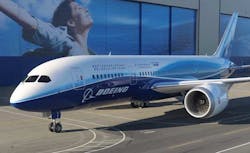Jan. 03--In a bare-knuckled display of corporate muscle, The Boeing Co. convinced its often-unruly Machinists union members to accept a new contract that ends their traditional pension and includes other benefits and wage cuts.
The Friday vote came after an ultimatum from Boeing -- approve the new contract or it would consider moving assembly of the company's next-generation passenger jet and construction of an advanced, composite airplane wing out of the Northwest.
It was a stunning reversal from an earlier vote in November, when the union overwhelmingly rejected a similar contract.
For Sam Butcher-Doty, 24, an apprentice Boeing machinist and the 1,200 other union members at the company's Gresham plant, it was a painful comeuppance. Butcher-Doty voted against the contract, even though it imperiled his job because he felt it was unfair to his fellow workers.
Not that Butcher-Doty had high hopes for the vote. "It's a lose-lose for us either way," he said Thursday. "Either we reject the contract and they move the wing, we go on strike and lose our wages, or we accept the cuts."
The good news for union members is greater job security, if decidedly less retirement security. The good news for the region, in the words of Washington Gov. Jay Inslee is that the state "secured its place as the aerospace capital of the world." Boeing said it will keep assembly of the 777X and its high-tech wing in the Northwest with a yes-vote.
In the earlier vote, the 30,000 Boeing Machinists effectively called the company's bluff, many of them believing the talk of relocation was an empty threat. But as the weeks dragged on and Boeing showed no signs of relenting, union members thought better of their earlier defiance.
The company
Boeing is one of the marvels of the industrialized world.
It is one of the two dominant airplane makers in the world. It employs more than 174,000, most of them in the Northwest. And despite some high-profile glitches with its 787 Dreamliner, the company is on a roll.
It is projected to earn a record $4.5 billion in its 2013 fiscal year on revenue in the range of $85 billion. Air travel continues to grow -- Boeing itself projects sustained 5 percent annual increases in passenger and cargo traffic over the next 20 years.
On Dec. 16, Boeing hiked its dividend by nearly a third, which Boeing CEO Jim McNerney was warranted by the company's "sustained, strong operational performance."
That doesn't sound like a company in trouble. But it's undeniable that Airbus, Boeing's chief competitor, has made considerable strides. The two companies are locked in a fiercely competitive duopoly atop the industry.
Airbus's strength was illustrated in October when it made new inroads into the Japanese market, long a Boeing stronghold. Japan Airlines ordered 31 Airbus A350s, with a list value of $9.8 billion.
The deal indicates Boeing is paying a price for the troubled rollout of its 787 Dreamliner. The company for the first time farmed out much of the 787 production to subcontractors around the world. Resulting production issues and fires that broke out in a handful of 787 batteries led to a temporary global grounding of the aircraft early last year. The issues shook the confidence of some customers.
The next-generation 777X is tremendously important to Boeing, in part because of the 787 problems. And the world's initial reaction to Boeing's 777X has been heartening. Even though the plane is still some six years away, airlines have ordered 259 of them as of October worth an estimated $97 billion.
The Union
More than 34,000 of Boeing's 175,000 employees belong to the Machinists union, 1,200 of them at the company's Gresham facility.
They are well paid. Some take home $100,000 a year or more. Even Butcher-Doty, the young apprentice, earns about $30 an hour, or $60,000 annually.
The Machinists also enjoy benefit packages most Americans can only dream about, chief among them a traditional defined-benefit pension plan that guarantees a monthly income for the duration of their retirement.
They can be a combative bunch. Boeing Machinists walked out on strike in 2005 and 2008 in earlier disputes with management. In November, despite the urging of some of their senior union leadership, the machinists overwhelmingly rejected Boeing's contract.
They voted Friday on a slightly sweetened version of that contract.
The company on Thursday urged the workers to voluntarily accept the benefit cuts and wage changes. Boeing's message: Their future employment may hinge on their acceptance of a grim new reality of heightened global competition.
"Our world has changed dramatically," the company said. "Tight competition means the airplanes we are selling now are at significant discounts relative to those in the past. What we do today and tomorrow to better manage costs will have an impact on our earnings years down the road."
John Kleiboeker has worked at Boeing's Gresham plant for 16 years. He cuts and shapes aluminum, titanium and other exotic metals into aircraft parts. He's also president of the Machinists Local Lodge 63.
"They want our pension, that's the biggest single issue," he said. "I've got 15 years to retirement. If it freezes now, I'm looking at a loss of $250,000."
To make up for the lost pension, the company has offered a new 401k plan, on top of the 401k already in place, replete with some hefty initial company matches.
The 401k and other so-called defined contribution plans long ago supplanted traditional pensions as the country's dominant employment-based retirement vehicle. But unlike a pension, a 401k provides no guaranteed payments, retirement nest eggs can plummet in turbulent market conditions and all the risk for making the right investment decisions is shifted from the company to the employee.
"If I knew anything about stocks and bonds I wouldn't be working as a machinist," said Steve Bergeron, a seven-year veteran of the Gresham plant. "There are a million ways these guys can steal my money."
Kleiboeker shakes his head when asked to explain the company's hard-nosed demand for concessions. "It just doesn't make sense," he said. "The company is highly profitable. The stock is red hot. The CEO is making buckets of money."
Indeed, part of CEO McNerney's $27 million compensation in 2012 was more than $8.7 million in executive pension and supplemental retirement benefits.
The executive pensions are not on Boeing's chopping block.
The community
The Boeing dispute has emerged as a potential disaster for Washington Gov. Jay Inslee. His political epitaph could be permanently rewritten by Friday's vote.
It's not for lack of trying to accomodate the company. In barely a week in November, Inslee managed to corral the Washington Legislature into a special session, where he ramrodded through $8.7 billion in tax breaks and other goodies for Boeing. By most accounts it was the largest corporate tax break in U.S. history.
But that wasn't enough for the company. It demanded a two-fer: the tax breaks and the Machinists' concessions.
Inslee, a liberal, labor-friendly Democrat, was caught in a political vise. "I can fully understand why someone could look at this contract proposal and have a feeling that it's unfair," he said in a recent television interview. " ... But I also fully understand the realities and the real-life circumstance we face -- that this is an extremely competitive market and that people's jobs are at stake."
The situation infuriated some lawmakers, who wondered that the Northwest's long support of the company seemed to count for little. "Tax breaks and lowering wages can't be the cornerstone of our economic development policy," said Bob Hasegawa, D-Seattle, one of the few legislators to vote against the Boeing package.
But 22 states jumped at the change to land the Boeing 777X facility.
They may well have gulped when they got a look at Boeing's demands. The company says it needed land, building and facilities for the 777X assembly and wing production estimated to cost $10 billion. Boeing expected its new host to provide that site for "low or no-cost," according to a Boeing RFP leaked to the press.
On top of that, it wants infrastructure improvements, tax breaks and other incentives.
Industry analyst Richard Aboulafia predicted saner heads will prevail and Boeing will keep 777X production in the Northwest despite what he called its "toxic relationship" with the Machinists. For one thing, customers unnerved by the 787 outsourcing experiment, will be reassured if 777X product remains in-house.
"Boeing management needs a reality check," Aboulafia wrote in November. "Giving workers some of what they want would have a negligible impact on competitiveness, particularly since it would reduce costs and mitigate risks associated with moving the line. If management won't compromise, that has less to do with economics and more to do with personal distaste."
-- Jeff Manning
Copyright 2014 - The Oregonian, Portland, Ore.





